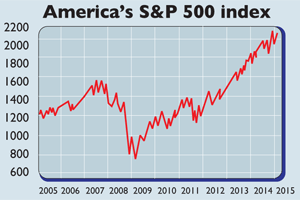US earnings crumble
US stocks have hit new record highs despite the deteriorating earnings outlook for American companies.

Get the latest financial news, insights and expert analysis from our award-winning MoneyWeek team, to help you understand what really matters when it comes to your finances.
You are now subscribed
Your newsletter sign-up was successful
Want to add more newsletters?

Twice daily
MoneyWeek
Get the latest financial news, insights and expert analysis from our award-winning MoneyWeek team, to help you understand what really matters when it comes to your finances.

Four times a week
Look After My Bills
Sign up to our free money-saving newsletter, filled with the latest news and expert advice to help you find the best tips and deals for managing your bills. Start saving today!
After a shaky start to the year, stockmarkets have hit new highs. America's S&P 500 index, which usually sets the global tone, has hit a new record around 2,100. Positive data in Europe and optimism over potential deals in Ukraine and Greece have bolstered stocks. Liquidity continues to provide a lift too, of course. According to Evercore ISI, an investment bank, central banks across the world have loosened monetary policy 514 times in the past three years.
All this is just as well as far as the S&P is concerned, because the outlook for US earnings has deteriorated. Around four-fifths of the S&P's 500 firms have now reported their profits for the final quarter of 2014. So far, profits have grown by around 4.1% year-on-year, while sales have expanded by 1.6%. Strip out Apple, and earnings are growing at less than 2%.
The 50% drop in the oil price has hurt the energy sector, which makes up almost 10% of the index. Meanwhile, "the strong dollar is hurting", notes Socit Gnrale's Albert Edwards. The greenback has risen to a ten-year high against a basket of America's major trading partners' currencies. That is undermining S&P companies' foreign sales, which are worth half of total revenues.
MoneyWeek
Subscribe to MoneyWeek today and get your first six magazine issues absolutely FREE

Sign up to Money Morning
Don't miss the latest investment and personal finances news, market analysis, plus money-saving tips with our free twice-daily newsletter
Don't miss the latest investment and personal finances news, market analysis, plus money-saving tips with our free twice-daily newsletter
Last April, analysts were pencilling in year-on-year earnings growth of 14% in the first quarter of 2015. Now they are expecting a fall of 1.4%. At the start of 2015 the forecast was still 5.3%. Similarly, six weeks ago Wall Street expected earnings growth of 8.1% in 2015 as a whole. Now that has been slashed to 2.6%.

All this would matter less if the S&P weren't priced for perfection. The forward price/earnings (p/e) ratio is at a ten-year high of just under 17. The cyclically adjusted p/e is 26, far above the long-term average of 18. An overvalued market is more vulnerable to disappointments.
"We have a combination of cyclically high profits, a downward trend in [earnings] revisions and above-average valuations," says economist.com's Buttonwood blog. "That ought to be cause for concern."
Get the latest financial news, insights and expert analysis from our award-winning MoneyWeek team, to help you understand what really matters when it comes to your finances.

-
 Should you buy an active ETF?
Should you buy an active ETF?ETFs are often mischaracterised as passive products, but they can be a convenient way to add active management to your portfolio
-
 Power up your pension before 5 April – easy ways to save before the tax year end
Power up your pension before 5 April – easy ways to save before the tax year endWith the end of the tax year looming, pension savers currently have a window to review and maximise what’s going into their retirement funds – we look at how